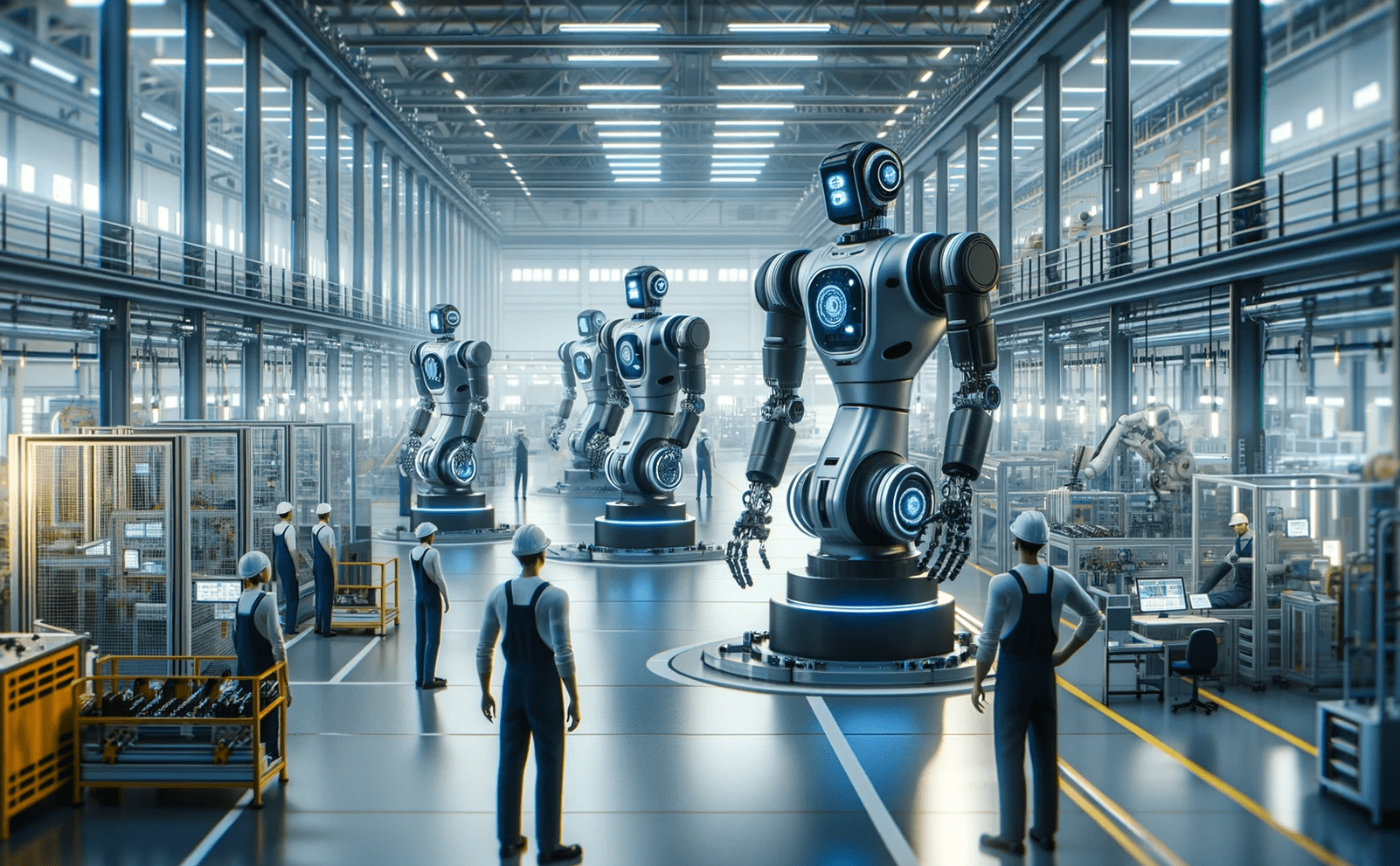What follows after the stupid robots in our factories today?
Robots in production processes are “dumb by design”. We have been using robots in manufacturing for over 30 years. In fact, however, these first-generation robots are a dead end, especially in the automotive industry, because we have developed them to be dumb by design. They have to be programmed for months and cannot react to special features. To make their work possible in the first place, a workpiece has to be clamped with an accuracy of a tenth of a millimeter and every small change throws them off course. This means that the programming has to be adjusted again by human hand and the question of time saved by said robots is clearly negative for smaller quantities. For this reason, robots mainly perform heavy and dirty tasks or tasks with a high repetition frequency. The systems have no understanding of their environment and therefore cannot actually make any decisions. Everything has to be communicated to them in advance.
Behind this is a human-machine image of absolute predictability. Over the last 30 years, we have wanted one thing above all: determinism. We humans tell the machines what to do. This actually sounds good, but it means that we can only use these robots with a great deal of planning effort and they can only be used in use cases with large quantities, such as in electronics production or the automotive industry.
Cobots as a new paradigm for semi-autonomous systems
All of this is changing with cobots. These are primarily small robotic arms with payloads ranging from 8 to 25 kilograms. You probably remember the nice press photos of our former German Chancellor interacting with a robot-like creature or enthusiastically shaking hands with an artificial arm – these are cobots. They no longer need safety cells that no human is allowed to enter as long as the robot is moving. We are teaching these cobots to perceive a human and to work together with humans in the production process.
But that’s not all: We are teaching them to recognize the position of workpieces and to be able to react flexibly. Each sub-step no longer has to be laboriously coded by programmers; instead, the machine operators in production management can teach the cobots new tasks by demonstration. Compared to their old relatives (the robots that are over 30 years old) they are therefore much more flexible and, above all, more helpful. We will be able to use cobots like these everywhere in the future: in small production processes, but soon in private households or care, too. In order for such a cobot to generate added value, it still has to perform very complex tasks for machines today, such as collision detection, or gripping various objects (from eggs to pieces of metal or polystyrene) with adapted strength, independently and semi-autonomously. We are teaching machines a million years of evolution towards humans and encoding this know-how in algorithms and operating systems for cobots. Without autonomy and the ability to make their own decisions, such a machine has no added value for us.
Cobots as helpers in our households
For the first time, it seems realistic that in the next 10 years we will be able to create machines that can load and unload a normal dishwasher without us having to adapt the entire kitchen to the machine and its capabilities. In the foreseeable future, we could be able to build machines that serve us humans in our environments, instead of having to adapt the conditions to the machine in the best possible way (as we have done in the production halls up to now).
Up to now, the idea of efficiency has led us to let the robots do what they are particularly good at, and we humans have then done what robots have not yet been able to do. This is actually an upside-down world that we can now change with the new cobot approach. In these peaceful scenarios, cobots that are as autonomous as possible and serve us humans seem like a positive idea. This is a new paradigm. But of course there are some critics who criticize the lack of determinism. And they are not entirely wrong: The loss of human autonomy that we can already observe in the military today could also become a problem here. The use of such machine capabilities can call our humanity into question in the long term.
Simulation as planning for our future
No matter where we use physical machines: They are always more expensive than simulating machines in virtual space. We create digital twins to simulate and optimize the expensive real world of materials and production.
In a virtual world, we make decisions before the first component exists in the physical world. We are in the process of mapping our entire physical world via Google Maps or other programs and managing every object digitally. We control our smart home via our smartphone and rely on the reliability of the digital world.
We not only let the algorithms decide where to drive our car, but also have completely new optimization strategies for which we lacked the data 20 years ago: shortest route, fastest route, most energy-efficient route. But at some point, we find it too inconvenient to have these choices and let a personal assistant decide for us. Are we giving up autonomy or are we gaining the opportunity to focus on the important things? Or are we dramatizing everything here and speculating about wild AI scenarios that will never happen or will not take on the scale described here for a long time? I cannot answer the first question conclusively, but I can clearly answer the latter in the negative. Whether we like it or not, AI will also bring about a noticeable change in the form of cobots.
Robots and cobots are changing our humanity
Robots and cobots are opening up two new worlds that affect our humanity: On the one hand, they will become increasingly independent companions in our everyday lives, taking on more and more tasks over the next few years that were previously performed by other people. The behavior of cobots will very quickly become so complex that it will no longer be deterministic in detail. We are beginning not only to work together with other people, but also to cooperate with other machines – the machine as a substitute for human interaction partnership. On the other hand, we will simulate all processes in which we use cobots in relation to production processes to such an extent that we will shift key decisions on the design of processes and procedures to virtual worlds. Our digital twins are given decision-making power. The management of production processes, with all its many decisions, will therefore be largely shifted to virtual simulation processes. This will have a massive impact on product design, production, sales, marketing and support, as almost complete models and data sets will be available for all aspects in the future. Which decisions will still be made by humans? One of many unanswered questions that only the future can answer.
A powerful change and many unanswered questions
Robots and cobots are the executing bodies for newly emerging AI models. The introduction of flexible and AI-driven cobots as a new implementation of the previously absolutely deterministic robots will be the next big change for us humans in our dealings, encounters and interactions with AI. While we have operated or guided machines up to now, we will interact with cobots in a different way, This will have a significant impact on our decision-making scope. Humans will no longer have a clear position of supervision over all machine actions. The future will show to what extent this will lead to relief or problems. However, it is already important to create an awareness of these developments in order to create a broad basis for this major change. Discussion and exchange about this development will take us further, while fear and obstruction of such innovations will only set us back and leave us standing still.



